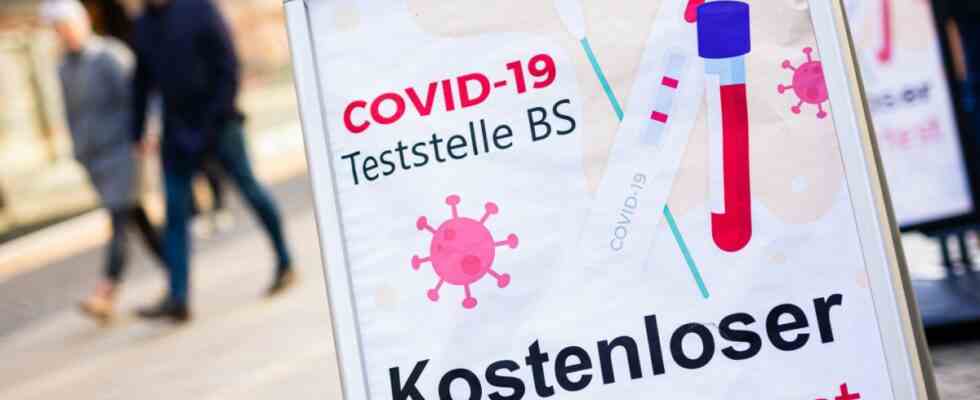The crucial tip came from an anonymous caller: On March 8 last year, the stranger informed the police that things were not going right at a corona test station on Karl-Lederer-Platz in Geretsried. At best, 30 to 40 tests would be carried out there every day. In fact, the operators of the test station billed a “significantly higher number” of tests to the Bavarian Association of Statutory Health Insurance Physicians (KVB), the anonymous person claimed, said a criminal investigator on Wednesday before a lay judge at the Munich district court. The 31-year-old telecommunications salesman Samih M. and his fiancee, the employee Valentina K., 34, were accused in the proceedings.
The two operators of the Geretsrieder test station in the hall of the district court in the dock.
(Photo: Karl-Josef Hildenbrand/dpa)
The investigations confirmed the information provided by the “whistle-blower”. As it turned out, M. and K., as operators of the test station, only carried out eight corona tests in January last year. However, they had reported 1442 tests to the KVB for this period. The test numbers for February 2022 were also wrong. After all, that month 1,480 people had themselves tested for the corona virus at the station on Karl-Lederer-Platz. However, the two owners billed the KVB for 12,201 tests too much. Due to the incorrect information, the Association of Statutory Health Insurance Physicians transferred 154,000 euros too much.
And the damage would probably be even greater if the investigators from the criminal police had not been investigating at full speed. Because Samih M. and his accomplice were about to report the number of tests for March 2022 to the KVB. According to their list, it should have been 18,491. In reality there were only 1706. The KVB would have incurred further damage of 188,327.70 euros if they had paid. In addition, the defendants had issued negative test certificates without prior tests for SARS.CoV 2 in several cases.
Right at the beginning of the hearing, Samih M. and Valentina K. admitted the allegations made by the Central Office for Combating Fraud and Corruption in the Health Care System (ZKG) at the Nuremberg Public Prosecutor’s Office. When asked about his motive, the telecommunications salesman explained: “It was really greed, to get to the point.” He and his fiancée used the money transferred from the KVB primarily for a life in the lap of luxury. Among other things, M. and his fiancée leased three Audi cars for themselves, including an R 8, priced at around 166,000 euros, and also treated themselves to “smart clothes” and vacation trips to Italy. Valentina K. also admitted to the allegations from the indictment and said that she very much regretted the act.
It was apparently made easy for Samih M. and his fiancee to make money with fake corona tests. Until the search of their apartments and their test station, there were no checks by the KVB, said the clerk at the Kripo. “The guidelines were just lax,” said the investigator for the record. Apparently so lax that Samih M. thought about opening another test station and using a special booking system. It was designed in such a way that it automatically added names from telephone books to incorrectly entered test numbers and generated data records that were intended to give the impression that everything was correct.
The lawyers for the accused wanted to conclude a perpetrator-victim mediation with the KVB before the trial began. To date, no one has responded to the offer from the KVB, they explained. The court sentenced Samih M. to two years and ten months in prison for fraud and attempted fraud. Valentina K. received a prison sentence of two years and three months. In her verdict, the presiding judge spoke of “socially harmful behavior” on the part of the accused. Through their defense attorney, Samih M. and Valentina K. announced that they wanted to appeal the verdict.

